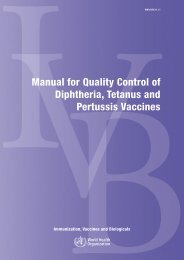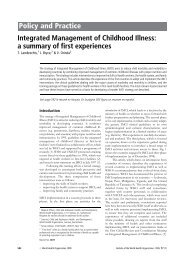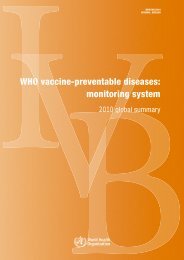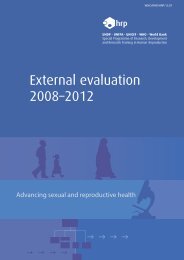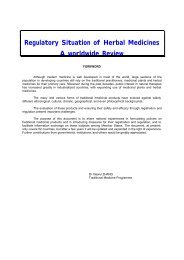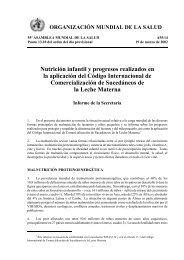IPDE - Extranet Systems - World Health Organization
IPDE - Extranet Systems - World Health Organization
IPDE - Extranet Systems - World Health Organization
You also want an ePaper? Increase the reach of your titles
YUMPU automatically turns print PDFs into web optimized ePapers that Google loves.
120 Manual<br />
data. If examiners have access to information from family, friends, mental<br />
health professionals, records, etc., that clearly contradicts a subject's<br />
responses regarding a particular criterion, then they may score the criterion<br />
in the informant column provided two requirements are met. Firstly,<br />
they should have more confidence in that information than they do in the<br />
subject; and secondly, the other source must satisfy the identical scoring<br />
guidelines that apply to the subject's response. Later, in entering ratings<br />
in the computer or transcribing them from the interview to the scoresheet,<br />
the scores based on the subject's report are bypassed in favour of<br />
those derived from the informant.<br />
While it is necessary to administer the PDE with knowledge of a subject's<br />
psychiatric history and current mental state, the examiner should<br />
avoid making detailed inquiries about the subject's personality prior to the<br />
interview. It is probably not advisable to confront subjects during the interview<br />
with discrepancies between their accounts and information obtained<br />
from others. Making them aware of the discrepancies could adversely<br />
affect rapport, and also create discord between the subject and informant.<br />
Examiner qualifications and training<br />
The <strong>IPDE</strong> ICD-l0 Module presupposes a thorough familiarity with the<br />
ICD-10 classification system of mental disorders, and considerable training<br />
and experience in making psychiatric diagnoses. Like any semistructured<br />
clinical interview, its reliability and validity are inseparable from<br />
the qualifications and training of the person using it. It is designed for<br />
experienced psychiatrists, clinical psychologists, and those with comparable<br />
training, who are capable of making independent psychiatric diagnoses<br />
without a semistructured inte~ew. It is not intended for use by<br />
clinicians in the early phase of their training, or by research assistants,<br />
nurses, and medical or graduate students.<br />
The first step in training to use the PDE is to study the interview and<br />
manual very thoroughly. Before the basics are mastered. the interview<br />
should be administered to several subjects primarily to get a 'feel' for it,<br />
and to make the instructions in this manual and the scoring guidelines<br />
more meaningful. Then the neophyte should examine a series of patients,<br />
following the instructions and scoring guidelines as closely as possible.<br />
This is best done with a colleague, someone who has already mastered<br />
the instrument or is also learning how to use it. These practice interviews<br />
should be followed by a critique, and a discussion of any problems in<br />
administration and scoring. Most clinicians will feel comfortable with




